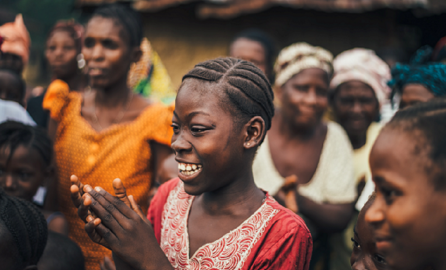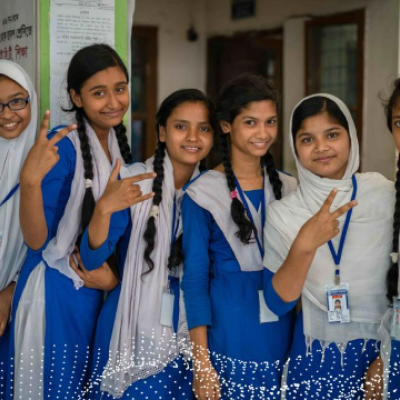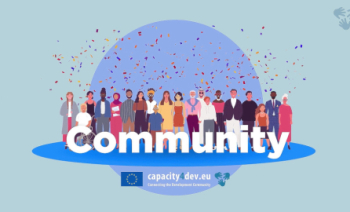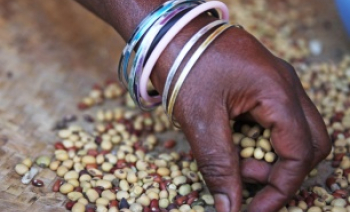Gender equality and women’s empowerment are at the very heart of the European Union values, guiding practice both within and beyond its borders. DG DEVCO has an active, enthusiastic network of Gender Focal Persons (GFPs) who work to mainstream gender, both at headquarter and EU Delegations level. They ensure that gender issues are included in all actions, to advance EU commitments to gender equality as well as the 2030 Sustainable Development Agenda.
• Institutional shift. GFPs are instrumental to mainstreaming women’s and girls’ empowerment and finally ensuring gender equality. They are contributing to shifting EU institutional culture at headquarter and EU Delegations level. Find out more.
• Working with partners. The cases of the Philippines and Guinea demonstrate the effort made by the GFPs and the EUDs to team up with local actors and international partners, and the crucial role of civil society to shift position lines on gender issues. Find out more about the Philippines and Guinea.
The EU Gender Action Plan 2016-2020 (1) is the current framework for promoting gender equality and women’s empowerment outside EU borders.The Gender Focal Persons’ objective is to integrate gender perspective into every stage of policy and programme; whether in designing, implementing, monitoring or evaluating EU initiatives.
During the annual meeting of EU GFPs, representatives from EU Delegations in the Philippines and Guinea shared their experiences on promoting gender equality by setting up policy dialogues with local actors, including civil society organisations (CSOs).
An alliance with the Philippines
“In the Philippines, we have two big programmes fostering and advancing gender equality and women’s empowerment. The main one is the Safe and Fair programme funded by the EU and implemented by UN Women and the International Labour Organisation (ILO),” explains Stephanie Carette, GFP and Programme Manager at the EU Delegation to the Philippines. While the Safe and Fair programme targets female migrant workers,the second programme called ‘WeEmpower Asia’ aims to boost women’s economic empowerment.
According to the World Economic Forum 2020 analysis, the Philippines claims the smallest gender gap of the Asian continent by far: the country has closed 80% of its Economic Participation and Opportunity gender gap (2). However, according the United Nations Development Programme’s (UNDP) Gender Inequality Index, the country still faces high rates of maternal mortality and teenage pregnancy, as well as an inequal labour force participation, and hence ranks 98 (out of 153 countries, where the best is 1) in these areas.
Walking on a tight rope
Even though the economic participation of women has improved in the Philippines, many inequalities persist for female labour migrants. Although women are vulnerable and face high risks of violence and trafficking, the current legal framework does not protect them.
Stephanie Carette and her colleagues at the Political and Information section of the EU Delegation in Manila, work together to ensure that women’s voices are heard. They share testimonies and organise conferences and public awareness campaigns aimed at changing attitudes and behaviours towards gender.
Raising the issue of gender, as was done during a public debate organised on Women’s Day 2019, helps participants to gain confidence, build links with supporters, and encourage development of activities with the support of the EU Delegation. A few months after that debate, the government signed a new law banning public sexual harassments.
The EU Gender Champion
EU GFPs play a crucial role in facilitating the coordination of all EU efforts to protect women’s rights. In October 2019, Stephanie Carette launched the EU Gender Focal Persons group, which brought together ten EU Member States, national development agencies and the EU Delegation to the Philippines.
Its role is to aggregate data, resources and ideas, work together on advocacy and capacity building action, harmonise the consultation process with partners, and strengthen internal capacity in gender mainstreaming. Thanks to the efforts of the group, in early 2020, the EU Ambassadors appointed the Austrian Ambassador Bita Rasoulian as the EU Gender Champion in the Philippines.
"My goal is to work hand-in-hand with the EU, its partners and stakeholders, and in close alignment with the priorities of the Philippine government and the needs of the Filipino people, so that we can strengthen dialogue and create new partnerships towards a more equitable and inclusive society", said Bita Rasoulian during the EU Gender Champion presentation in March 2020.
The role of Stephanie Carette is to complement the actions of the EU Gender Champion by speaking on behalf of the EU in meetings and events on gender equality and women’s empowerment, and to promote gender mainstreaming in the work of the EU Delegation.
The GFPs could not achieve results without local actors, such as national and local government, women organisations and other community-based organisations, research institutions and academia, media networks, and the business sector.
In the following video, Stephanie Carette, Programme Manager and Gender Focal Person at the EU Delegation to the Philippines, shares her experience working with local stakeholders on gender programmes.
Empowering CSOs to fight violence against women in Guinea
The consolidation of the rule of law is crucial for Guinea. The EU is supporting legal sector reform through a programme to improve Guinea’s justice sector, the 'PARJU' programme (3). One of the objectives of the programme relates to the fight against impunity, which is linked to combating violence against women.
The EU Delegation to Guinea is active in supporting women’s quest for justice for the 2009 massacre, where more than 150 people were killed, many were wounded, and more than a hundred women were victims of rape and other forms of sexual violence.
“The big issue is the trial of the September 2009 massacre. There were many victims, mostly women. The EU is providing medical and psychological support to survivors,” says Pratima Frantzen, Programme Manager at the EU Delegation to Guinea, and GFP. The country still lacks the provision of health services to survivors of violence. EU support is therefore essential to ensure that women and girls have access to comprehensive health and psychological services.
Building local capacities for advocacy and change
Gender equality and women’s empowerment in Guinea is widely addressed by close cooperation with civil society and non-governmental organisations.
The EU Delegation has been working with local and international CSOs together with European Member States. In Pratima Frantzen’s words, “we organised workshops to empower CSOs to speak out on gender issues such as Female Genital Mutilation (FMG), gender-based violence, slavery and early marriage.”
Guinea has one of the highest rates of FGM in the world. According to UNFPA, 97% of women and girls, aged 15-49, have undergone some form of FGM. And according to UNICEF, Guinea has the eighth highest rate of child marriage in the world.
The EU helps civil society organisations to get the resources and knowledge needed to tackle gender issues. Pratima Frantzen explains, “we try to improve their (CSOs) coordination and synergy so that they become a real force of advocacy and action before the ministries.”
These cases are just two examples of how EU policy and political commitments to gender equality are translated into a set of concrete actions. Ongoing activities worldwide help to produce crucial results for girls and women, and the network of GFP are an essential part of it.
In the following video, Pratima Frantzen, Programme Manager and Gender Focal Person at the EU Delegation to Guinea, speakes about gender programmes.
(1) The EU Gender Action Plan 2016-2020 (GAP II) provides the framework for the European Commission, the European External Action Service, and the EU Member States, in their approach to gender equality through external action. Its implementation is mandatory for all external relations of the EU and an implementation report of the GAP II is produced every year to monitor progress achieved. The GAP II has four thematic priorities: 1) Ensuring girls’ and women’s physical and psychological integrity; 2) Promoting the economic and social rights / empowerment of girls and women; 3) Strengthening girls’ and women’s voice and participation and 4) Shifting the Commission services’ and the EEAS’ institutional culture to more effectively deliver on EU commitments.
(2) “The country’s performance is strong across three of the four dimensions of the index. (…) Women (are) outnumbering men in senior and leadership roles, as well as in professional and technical professions. It is only one of four countries to achieve this feat. The country ranks 5th on the indicator assessing gender wage equality (...)”.Global Gender Gap Report 2020, World Economic Forum.
(3) The Programme to support justice sector reform (PARJU). The PARJU programme (€20 million) supports the Government's efforts in promoting democratic principles and respect for human rights, in particular as regards justice and the fight against impunity in the Republic of Guinea.
Credit: Videos © Capacity4dev| Photo © Joey Pilgrim on Unsplash






Log in with your EU Login account to post or comment on the platform.